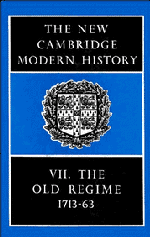Book contents
- Frontmatter
- CHAPTER I INTRODUCTORY SUMMARY
- CHAPTER II THE GROWTH OF OVERSEAS COMMERCE AND EUROPEAN MANUFACTURE
- CHAPTER III THE SOCIAL CLASSES AND THE FOUNDATIONS OF THE STATES
- CHAPTER IV THE VISUAL ARTS AND IMAGINATIVE LITERATURE
- CHAPTER V THE ENLIGHTENMENT
- CHAPTER VI RELIGION
- CHAPTER VII MONARCHY AND ADMINISTRATION
- 1. European practice
- 2 The English inspiration
- CHAPTER VIII THE ARMED FORCES AND THE ART OF WAR
- CHAPTER IX INTERNATIONAL RELATIONS
- CHAPTER X THE DECLINE OF DIVINE-RIGHT MONARCHY IN FRANCE
- CHAPTER XI ENGLAND
- CHAPTER XII THE WESTERN MEDITERRANEAN AND ITALY
- CHAPTER XIII THE ORGANISATION AND RISE OF PRUSSIA
- CHAPTER XIV RUSSIA
- CHAPTER XV SCANDINAVIA AND THE BALTIC
- CHAPTER XVI POLAND UNDER THE SAXON KINGS
- CHAPTER XVII THE HABSBURG DOMINIONS
- CHAPTER XVIII THE WAR OF THE AUSTRIAN SUCCESSION
- CHAPTER XIX THE DIPLOMATIC REVOLUTION
- CHAPTER XX THE SEVEN YEARS WAR
- CHAPTER XXI THE DEVELOPMENT OF THE AMERICAN COMMUNITIES
- CHAPTER XXII RIVALRIES IN AMERICA
- CHAPTER XXIII RIVALRIES IN INDIA
- CHAPTER XXIV ECONOMIC RELATIONS IN AFRICA AND THE FAR EAST
2 - The English inspiration
from CHAPTER VII - MONARCHY AND ADMINISTRATION
Published online by Cambridge University Press: 28 March 2008
- Frontmatter
- CHAPTER I INTRODUCTORY SUMMARY
- CHAPTER II THE GROWTH OF OVERSEAS COMMERCE AND EUROPEAN MANUFACTURE
- CHAPTER III THE SOCIAL CLASSES AND THE FOUNDATIONS OF THE STATES
- CHAPTER IV THE VISUAL ARTS AND IMAGINATIVE LITERATURE
- CHAPTER V THE ENLIGHTENMENT
- CHAPTER VI RELIGION
- CHAPTER VII MONARCHY AND ADMINISTRATION
- 1. European practice
- 2 The English inspiration
- CHAPTER VIII THE ARMED FORCES AND THE ART OF WAR
- CHAPTER IX INTERNATIONAL RELATIONS
- CHAPTER X THE DECLINE OF DIVINE-RIGHT MONARCHY IN FRANCE
- CHAPTER XI ENGLAND
- CHAPTER XII THE WESTERN MEDITERRANEAN AND ITALY
- CHAPTER XIII THE ORGANISATION AND RISE OF PRUSSIA
- CHAPTER XIV RUSSIA
- CHAPTER XV SCANDINAVIA AND THE BALTIC
- CHAPTER XVI POLAND UNDER THE SAXON KINGS
- CHAPTER XVII THE HABSBURG DOMINIONS
- CHAPTER XVIII THE WAR OF THE AUSTRIAN SUCCESSION
- CHAPTER XIX THE DIPLOMATIC REVOLUTION
- CHAPTER XX THE SEVEN YEARS WAR
- CHAPTER XXI THE DEVELOPMENT OF THE AMERICAN COMMUNITIES
- CHAPTER XXII RIVALRIES IN AMERICA
- CHAPTER XXIII RIVALRIES IN INDIA
- CHAPTER XXIV ECONOMIC RELATIONS IN AFRICA AND THE FAR EAST
Summary
One problem of government which much interested politically-minded observers of the early eighteenth century was posed by England. In Sweden the elected Diet had, since 1718, made good its claim to control the king, but Sweden had thereafter declined as a Power. Poland, where the Diet could block any unpopular royal policy, was a by-word for weakness and anarchy, but England, though the parliament shared the government with the king, was steadily increasing in wealth and prestige. At the end of the seventeenth century the English were not regarded as models of political wisdom, yet these turbulent and seditious people had proved themselves the most formidable opponents of Louis XIV, were fast becoming the world's greatest colonial Power, increased yearly in wealth and nourished such geniuses as Locke and Newton. Locke's Essay concerning Humane Understanding, published in 1690 and immediately translated into French, had a formative influence upon the thought of a generation which hovered between traditional Christian metaphysic and the outright scepticism of Bayle; Newton's European reputation was achieved more slowly, but at no distant time he would be hailed as the prophet who had revealed the harmony of rational law behind the mysterious and chaotic face of nature. The time could not be long delayed when men would ask whether there might not be some link between these achievements and the political institutions of the country which produced them. In a more superficial way curiosity was stimulated by the influence of British party politics upon European affairs during the War of the Spanish Succession, and by the arrival, after 1714, of a new crop of Jacobite exiles who had, nevertheless, accepted the principles of limited monarchy.
- Type
- Chapter
- Information
- The New Cambridge Modern History , pp. 160 - 162Publisher: Cambridge University PressPrint publication year: 1957



